
The lab was busted in Ayshire (Picture: Getty)
Police uncovered the UK’s first known lab for a deadly drug linked to 38 deaths in Scotland this year.
A lab to make nitazenes,high-strength synthetic opioids which are sometimes mixed into other drugs,was found in Ayshire.
A board was told that the discovery of the lab and seizure of its equipment and products has led to a significant reduction in the supply of benzodiazepines – another type of drug which sometimes contains nitazenes.
The Scottish Police Authority’s board heard from senior officers on Thursday.
Deputy chief constable Jane Connors and chief constable Jo Farrell said there had been success in arresting people linked to the pill presses.
What are nitazenes?
Nitazenes are often believed to have reached markets in the West after being manufactured in China.
Their high strength,cheap manufacturing cost and the fact that drug users may not be aware of their presence in other substances,is what makes them dangerous,says Maryann Amirshahi,a medical toxicologist at the National Capital Poison Center.
‘They were originally studied decades ago in the 1950s as alternative opioid analgesics,but were never approved for human or veterinary use,’ she told Metro.
‘What makes them dangerous is that they can be hundreds of times more potent than morphine and even 10 times more potent than fentanyl,the major driver of overdose deaths.
Amirshahi said that nitazenes are often laced into illicit drugs and,given their strength,are ‘rapidly fatal’,making the drug trade even more unsafe.
‘Even a tiny amount can be fatal,’ she added. ‘Users may be unaware that they are consuming nitazenes because they are most commonly found as adulterants in other drugs.’
If someone overdosed on the drug,Amirshahi said that person must seek medical treatment and be administered with naloxone,which blocks the opioid’s effect on the brain.
Connors went on to say the force had a particular focus on dealing with ‘county lines’ drug dealing in the north of Scotland.
This refers to organised crime groups from cities setting up drug-dealing operations in towns or rural areas.
Last spring,the UK announced a further ban on synthetic opioids,including nitazenes,in a bid to tackle the issue.
But Ester Kincová,the Public Affairs and Policy Manager at Transform Drug Policy Foundation,says it won’t fix the problem.
She previously told Metro: ‘The government needs to support harm reduction measures and no longer criminalize people who use drugs or who have them in possession for personal use.
‘Criminalizing people continues their cycle of harm,but it also discourages people from engaging in services.’
A public health approach is ‘necessary’ to tackle the issue of synthetic opioids,she said.
‘If this is not treated as essential,then we may be seeing something that is far more difficult to deal with down the line.
‘Although we are concerned that there could be a higher increase in drug related deaths to synthetic opioids,we also believe that there is still time to bring in significant amounts of measures with adequate funding and treat it as a public health emergency to prevent the worst from happening.’
United News - unews.co.za